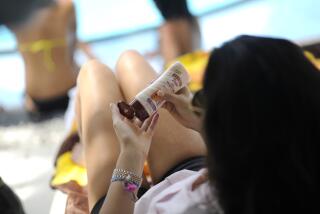BODY WATCH : Walking Won’t Do It, but There Are Labor-Inducers
- Share via
You may have heard it through the grapevine, from a reliable source or even from the office know-it-all.
As you’re listening to this homespun health information, you nod and think, “Yes. That makes sense.” Later, you wonder: True or false?
Here, experts debunk some common myths and give at least a partial blessing to some others.
* Physical activity such as walking will help induce labor when a woman is near her due date.
False. “Once in labor, walking can help speed things along,” says Dr. Irwin Frankel, obstetrician/gynecologist at Cedars-Sinai Medical Center and USC clinical professor of obstetrics and gynecology. “But it won’t induce it.”
Once a woman is “on the cusp of labor,” as Frankel puts it, there are two physical activities that will make it more likely: “sexual intercourse and/or pulling on the nipples.”
“Pulling on the nipples induces uterine contractions by secretion of the body’s own Pitocin (a hormone called oxytocin). Ejaculate from the male has prostaglandins. One theory is prostaglandins induces contractions as a woman gets closer to the due date, when there is increasing sensitivity of the uterine muscles to these agents.”
* Clicking sounds in the knee are nothing to worry about.
Usually true, says Dr. Jim Fox, orthopedic surgeon at the Southern California Orthopedic Institute, Van Nuys. “There are many reasons for clicking. Usually it’s due to a muscle imbalance or the knee cap momentarily not fitting in the groove. As long as there is no pain, swelling or limitation of movement, it’s probably nothing to worry about.”
Ditto for popping sounds, which Fox says are harmless 99% of the time.
Crunching sounds are a different matter, however. “Crunching means there’s wear and tear on a bone surface. And that usually means there is deterioration.” Seeing a doctor to investigate further is wise, he says.
* As you age, it takes longer to stop the bleeding when a cut occurs.
True--and false.
“One will bleed more easily and longer if taking aspirin,” such as those taking it on a long-term basis to minimize stroke and heart disease risk, says Dr. Irving Ackerman, an internist at Kaiser Permanente, Los Angeles.
“The skin gets thinner as we get older so less (traumatic) injury can break a blood vessel,” he says. “The blood vessels become closer to the surface. People seem to bruise more easily. But the body’s clotting mechanism is the same. In routine surgery, for instance, elderly people don’t necessarily bleed more than younger people.
“As one gets older, other diseases, such as kidney disease, can change the blood-clotting ability. But in healthy elderly folks, it should remain the same.”
* Sleeping with makeup on makes your face break out.
Possibly.
“The pores get clogged with makeup (and) bacteria,” says Dr. Carl Korn, a Sherman Oaks dermatologist. “Microorganisms will set up housekeeping. You might see a rash and pimples.”
More to Read
Sign up for Essential California
The most important California stories and recommendations in your inbox every morning.
You may occasionally receive promotional content from the Los Angeles Times.













